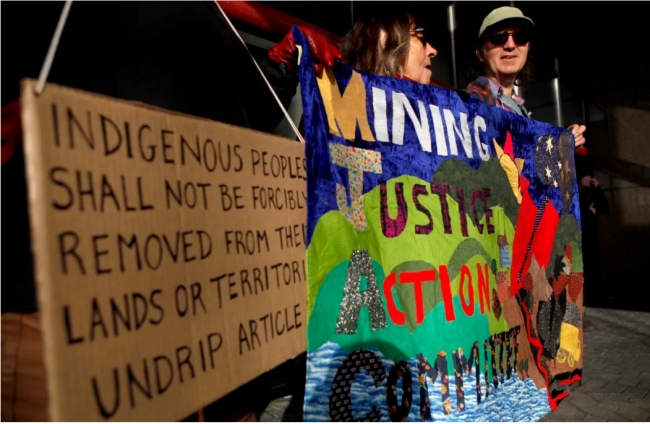Articles Menu

Two groups of First Nations have signed option agreements to acquire a 10-per-cent equity stake in the Coastal GasLink pipeline, a natural-gas project under construction in northern British Columbia.
The agreements, announced Wednesday, are exercisable when the pipeline comes into service and are subject to customary regulatory approvals.
For the First Nations involved, the potential equity stakes are one of the first opportunities they have had to own part of a project that crosses their traditional territory.
But the agreements with TC Energy Corp. are unlikely to defuse tensions around Coastal GasLink, which has faced opposition from some Wet’suwet’en Nation hereditary chiefs and their supporters, who say the pipeline company does not have the consent of hereditary leaders to cross the Nation’s traditional unceded territory.
Potential revenues from the project would allow communities to invest in areas such as roads, housing, schools and community facilities, said Corrina Leween, the elected chief of the Cheslatta Carrier Nation.
“The equity stake for my First Nations community is an ability for our people to start building their lives back,” Ms. Leween said, adding that the agreements set a precedent for how Indigenous communities can be partners in resource projects.
The agreements were signed by two groups: the CGL First Nations Limited Partnership and the FN CGL Pipeline Limited Partnership.
The first consists of 11 First Nations, including the Cheslatta Carrier Nation, that teamed up to negotiate through the First Nations Major Projects Coalition (FNMPC).
The second is made up of five elected band councils, including the Saulteau and Haisla.
An ownership stake would allow First Nations to gain more benefits from resource projects, rather than just living with the impacts, said Saulteau Chief Justin Napoleon.
“Historically, we’ve never had that opportunity,” Mr. Napoleon said.
The option agreements have been years in the making.
In 2019, Calgary-based TC Energy hired a financial adviser to manage the sale of up to 75 per cent of Coastal GasLink.
When it comes to fossil fuel subsidies, Canada is not the problem
In response, a group of about a dozen First Nations along the route, working with the FNMPC, initially went after a 10-per-cent stake, in addition to the 10-per-cent “set aside” for First Nations.
That bid failed when the coalition was unable to put together the financing in time, said Sharleen Gale, chair of the FNMPC.
For Ms. Gale and other coalition members, the experience highlighted gaps in access to capital for First Nations.
“This could have been so much more fruitful if the provincial government had an Indigenous loan-guarantee program – there would have been more benefits and more hope going to communities,” Ms. Gale said.
TC Energy completed the sale of a 65-per-cent stake in the pipeline venture in mid-2020 to Alberta Investment Management Corp. and KKR & Co. Inc.
TC Energy now owns 35 per cent of Coastal GasLink and has set aside the 10-per-cent equity stake for possible sale to 20 elected First Nation councils along the pipeline route.
That’s the stake that the two groups have signed options to acquire.
Sixteen of those are represented in the two groups that have signed option agreements. The remaining four have the option to sign on.
About 190 kilometres of the B.C. pipeline’s 670-kilometre route would cross the traditional, off-reserve territory of the Wet’suwet’en Nation.
The Office of the Wet’suwet’en, a non-profit society that represents hereditary chiefs who oppose the pipeline, has said elected Indigenous leaders don’t have jurisdiction over the Wet’suwet’en’s traditional territory.
Coastal GasLink previously signed project agreements with the elected band councils of 20 First Nations along the route.
Over the past few years, there have been clashes between demonstrators and police as RCMP moved in to enforce a court injunction that prohibits people from interfering with pipeline work.
Last month, Coastal GasLink reported an attack on workers at a site where preparations were being made to drill under Morice River, which is also known by its Wet’suwet’en name of Wedzin Kwa.
Coastal GasLink said a group of about 20 people, wearing masks and camouflage, in the early morning of Feb. 17 surrounded and attacked workers in what the company called “a highly planned and dangerous unprovoked assault.”
The attackers swung axes at vehicles and fired flare guns at workers, the company said. There were no physical injuries to Coastal GasLink workers, but employees fled for their safety and the attack caused millions of dollars’ worth of damage.
RCMP are investigating.
“The attack was an attack on the values we hold collectively, with our First Nations partners,” said Coastal GasLink president Bevin Wirzba.
The pipeline, now about 60-per-cent complete, is a crucial link for the $18-billion LNG Canada terminal now being built in Kitimat for exporting liquefied natural gas to Asia. Mr. Wirzba said he expects the pipeline to be finished as planned, with the potential equity stake for First Nations to be one of the most important elements.
“By setting a precedent, you can prove it can be done,” Mr. Wirzba said.
LNG Canada issued a statement to welcome Wednesday’s announcement. “It’s our job as organizations and as individuals to support and participate in economic reconciliation, and reconciliation as a whole,” said Denita McKnight, LNG Canada’s vice-president of corporate relations.
The terminal is being constructed on an industrial site on the Haisla’s traditional territory in Kitimat, with exports to Asia slated to start in 2025.
[Top photo: Wet'suwet'en supporters and Coastal GasLink opponents protest in Victoria, on Feb. 14, 2020.CHAD HIPOLITO/THE CANADIAN PRESS]